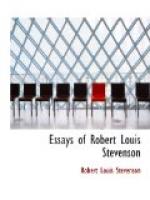Now this, of Mr. Wiseman, is the common opinion. A fact is not called a fact, but a piece of gossip, if it does not fall into one of your scholastic categories. An inquiry must be in some acknowledged direction, with a name to go by; or else you are not inquiring at all, only lounging; and the workhouse is too good for you. It is supposed that all knowledge is at the bottom of a well, or the far end of a telescope. Sainte-Beuve,[15] as he grew older, came to regard all experience as a single great book, in which to study for a few years ere we go hence; and it seemed all one to him whether you should read in Chapter xx., which is the differential calculus, or in Chapter xxxix., which is hearing the band play in the gardens. As a matter of fact, an intelligent person, looking out of his eyes and hearkening in his ears, with a smile on his face all the time, will get more true education than many another in a life of heroic vigils. There is certainly some chill and arid knowledge to be found upon the summits of formal and laborious science; but it is all round about you, and for the trouble of looking, that you will acquire the warm and palpitating facts of life. While others are filling their memory with a lumber of words, one-half of which they will forget before the week be out, your truant may learn some really useful art: to play the fiddle, to know a good cigar, or to speak with ease and opportunity to all varieties of men. Many who have “plied their book diligently,” and know all about some one branch or another of accepted lore, come out of the study with an ancient and owl-like demeanour, and prove dry, stockish, and dyspeptic in all the better and brighter parts of life. Many make a large fortune, who remain underbred and pathetically stupid to the last. And meantime there goes the idler, who began life along with them—by your leave, a different picture. He has had time to take care of his health and his spirits; he has been a great deal in the open air, which is the most salutary of all things for both body and mind; and if he has never read the great Book in very recondite places, he has dipped into it and skimmed it over to excellent purpose. Might not the student afford some Hebrew roots, and the business man some of his half-crowns, for a share of the idler’s knowledge of life at large, and Art of Living? Nay, and the idler has another and more important quality than these. I mean his wisdom. He who has much looked on at the childish satisfaction of other people in their hobbies, will regard his own with only a very ironical indulgence. He will not be heard among the dogmatists. He will have a great and cool allowance for all sorts of people and opinions. If he finds no out-of-the-way truths, he will identify himself with no very burning falsehood. His way took him along a by-road, not much frequented, but very even and pleasant, which is called Commonplace Lane, and leads to the Belvedere of Commonsense.[16]




